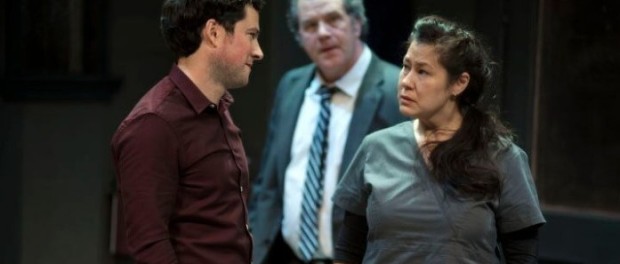Avenging But Not Angels : The Butcher
The Butcher (written by Nicolas Billon, directed Roy Surette) is a dark spectacle, a cinematic piece of theatre that requires a strong stomach to watch. It begins on what seems to be a dark and stormy night. Rain pours down from the ceiling on either side of a stage angled to make the audience feel like an unfortunate visitor stuck in the corner of a police station on Christmas Eve. An Agatha Christie-esque mystery begins. An older man in a military uniform (Chip Chuipka) mutters in an unknown Slavic-sounding language. He’s arrived at the station with a butcher’s hook tied around his neck and a business card for a copyright lawyer and the words “Arrest Me” written on it. A jovial police chief (Al Goulem) with two young kids and a wife at home tries to deal with him, hoping to get home before midnight. The aforementioned barrister named on the card (James Loye) arrives at the station “to do his bit,” but seems not to know the older man and claims not to understand the Slavic language. The three await a translator.
This televised police comedy opening, complete with intentionally ill-timed jokes and bad coffee, is a false bit of levity for the unnerving and uncomfortable story to come. The Butcher is not a show for those who dislike seeing torture and manipulation. It’s especially not a show for people who hate being exposed to visible violence (as opposed to implied violence). Thinking man’s theatre is not always meant to make the audience feel good, but awake.
When the translator (Julie Tamiko Manning) arrives, the old man is identified as a high ranking general from one side of a “civil war” in Lavinia. The butcher’s hook suggests that he is a specific general “The Butcher” who comitted horrific crimes against a segment of the Lavinian people who were kept in camps. He’s wanted by Interpol, as are his colleagues. Intrigue grows as the lawyer isn’t just a random unfortunate. He not only speaks Lavinian and knows general, but turns out to be a very close relative. And, well, no one is who they seem to be. We learn about a merciless group called the Furiori, victims of Lavinia’s civil war who are seeking vengeance at all costs. Yes, Furiori, like the Furies of Greek myth. The group seems to take as its guiding principle, “When you take away Justice’s scales, what are you left with? Her sword.” The opportunity to extract revenge on the general through torture and manipulation presents itself in horrific ways.
Then the gore begins. Someone has pulled out all of the general’s toenails earlier that day to judge from the fact they’re still bleeding. Things only get more graphic from there.
The heart of all the show is the complicated young lawyer, a Guardian-reading British expat who does not support the death penalty and retreats to his learned arrogance in the way that British public school boys do. It takes refined acting and scripting artistry to manipulate the audience’s feelings for him with such perfect control. I could say the same of the police chief who generates sympathy, discomfort, pity, and disgust. I admired the confident mastery in how the playwright, director, and actors succeed in these things. This same compelling, unpredictable variability drives the plot itself, though its graphic brutality put it beyond my tolerance. Deliberately thwarting the tradition of keeping violence off stage in a Greek drama, acts of torture and manipulation are done with Tarantino-esque visibility.
However good the show as a theatrical production, I did not like its treatment of generational vengeance and messages about the instigators and victims of genocide and civil war. While man has engaged in unspeakable horrors to other men historically, those in power usually do so with a sense of righteousness and purpose that goes beyond mere prejudice. In this show, the Lavinian victims almost seem to justify their prior treatment through their current cruelty on an innocent. The show says little about the war’s cause though I think through a war crime described almost entirely in a foreign language, the playwright wants us to believe it was one group entirely oppressing another. I needed more sense of victimization to justify the actions of the present day. Nonetheless, law, victims, and justice are related themes, but not necessarily aligned in neat order. Ultimately, I take comfort that I do not need the Butcher to reflect on my classicist’s armchair definition of justice, put into the mouth of Socrates: it never just to retaliate against an injustice with further injustice (that’s from the Crito, in case you are interested).
There is much in this show that is excellent. I have said nothing of its staging, its lighting, its acting, its costumes, its pace, its amazing use of language. The manipulation of the lawyer is mirrored by the manipulation of the audience. It is both elegant and chilling to experience. Still, I found the Butcher too brutal and too disturbing to recommend. Perhaps I am so sensitive to the violence of the show that I am blind to its other flaws. When I ran into cherished Rampage writer Angela Potvin, who day- and moonlights as a lawyer, I asked for her professional take, and she pointed out that no police station would ever be that empty. Point noted. I’ve contemplated if this was intended as an over-the-top vengeance story, like Inglorious Basterds or Django Unchained… but probably not. Sorry, Butcher, there’s enough of these kinds of horrors on the news that I’d rather not see this stuff viscerally dramatized.
The Butcher plays at the Centaur Theatre until November 29. $50/42/36/28. Click HERE for tickets.










